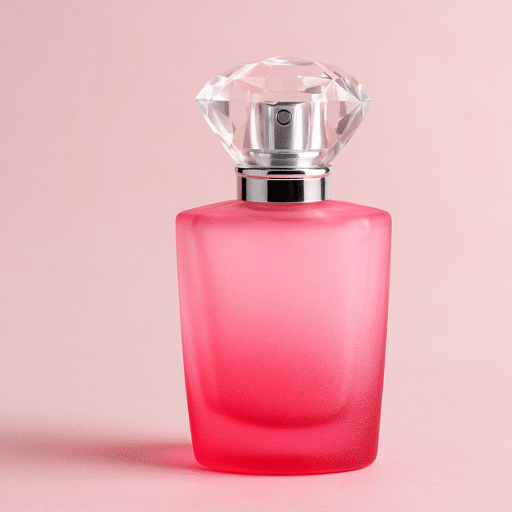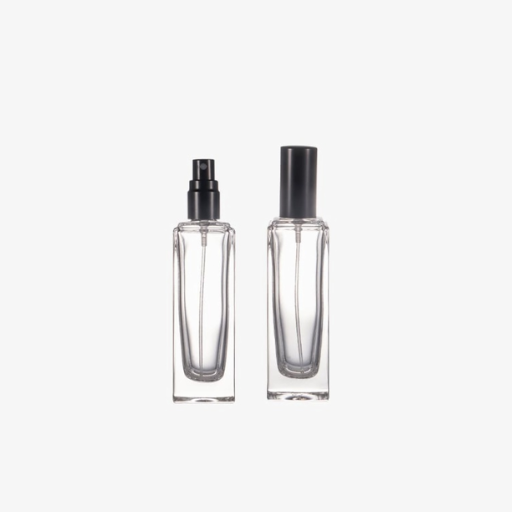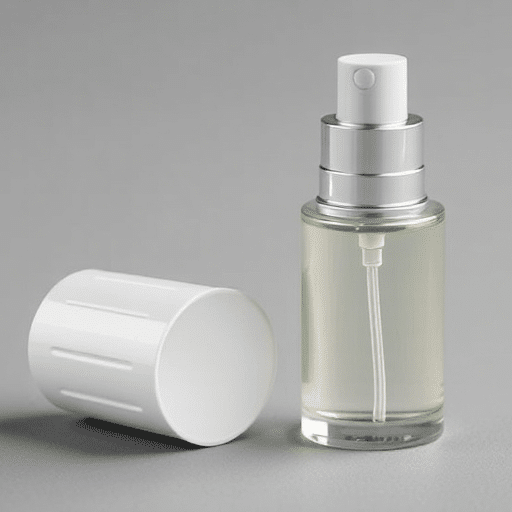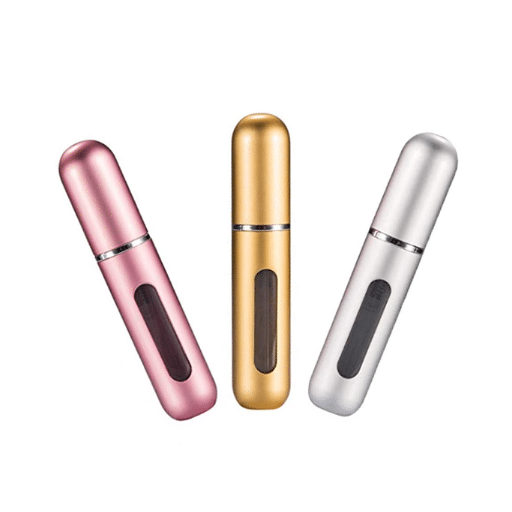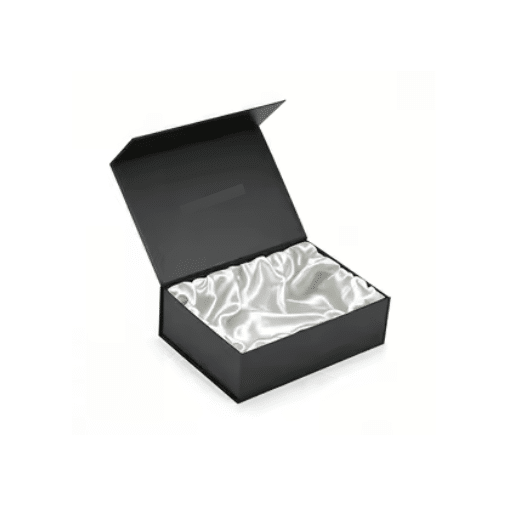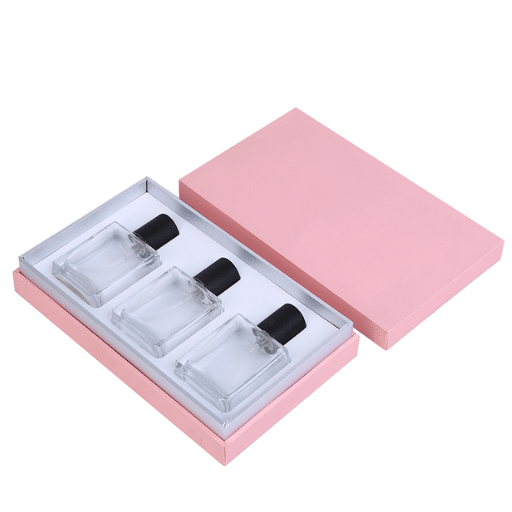History of Square Bottle Designs in the Fragrance Industry
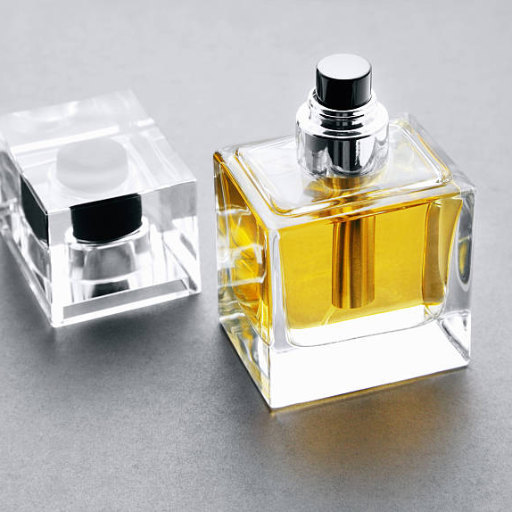
The history of square bottle designs in the fragrance industry dates back to the early 20th century, when manufacturers recognized the importance of giving the bottles a modern look while maintaining functionality. Taking inspiration from the Art Deco movement, square bottles became the epitome of clean, symmetrical lines with a subtle but sophisticated hope. The vendors and consumers appreciated this type of bottle because they were easy to stack and store. Such mass appeal gave other notable houses, like Chanel, avenues to use square bottles to represent elegance and timelessness, as in the classic Chanel No. 5. Since then, the square bottle has persevered throughout the years, straddling a line between substance and minimalism right at the intersection where aromas take on an artistic form.
The Origins of Square Bottles
Square fragrance bottles are a classic answer created to meet the demands for practicality, efficiency, and modern aesthetic appeal. In times past, when storing fragrance always required functionality to prevent leakage and environmental contamination of delicate formulations, the square design offered significantly better stability than its rounded counterparts, as it would minimize spills during manufacturing, transportation, and use. Besides, their symmetry made them easier to stack and allowed for the assembly-line production of bottles, which in turn favored the distribution mechanism.
The modern adoption of square bottles dates back to the early 20th century, when modern glassmaking methods made these more intricate designs accessible. Designers like Louis Cartier and increasingly powerful perfume houses, such as Chanel, took the square bottle to imply simplicity, luxury, and timelessness. Chanel No. 5 (1921) lies at the heart of this trend, helping to establish the bottle as a symbol of sophistication. Today, the square bottle remains the hallmark of luxury fragrance branding, striking a balance between pragmatism and elegance.
Evolution of Design Trends
Design trends, over time and across numerous industries, constantly evolve to accommodate technological advances in science and methods, concurrent with cultural shifts and shifting market preferences. Contemporary trends are moving towards minimalism, sustainability, and user-centric innovations. Minimalism has been gaining momentum, characterized by clean lines and aesthetics that convey the idea of its essential beauty, embracing timelessness and order. Sustainability has become an increasingly important concern, and designers are now expected to make choices that favor eco-friendly materials and processes within the contemporary awareness framework. On the other hand, we have now entered a digital era, and user-centric designs are built on the pillars of functionality, accessibility, and personal relevance, which significantly influence product or interface development. It is in this light that one may observe a reading that such trends highlight how innovation disrupts societal value systems in pursuit of refined craftsmanship.
Iconic Moments in Fragrance Packaging
Packaging fragrances has become a potent blend of art, design, and technology that deeply imprints itself in the psyche of consumers. Remembering the Iconic moments, Chanel No. 5 remains the eminent model; it was indeed the modern sophistication with which it entered into existence through its clean, minimalist design in 1921. An example of the defying idea of packaging was Jean-Paul Gaultier’s Classique bottle: the rebirth of daring allure! On the other hand, Marc Jacobs Daisy conveyed a playful yet extravagant feel with hands-on decorative floral motifs as the basis. Time and time again, these packaging milestones have stressed the convergence between innovation and storytelling in laying the foundations for lasting impressions.
Aesthetic Appeal of Square Fragrance Bottles
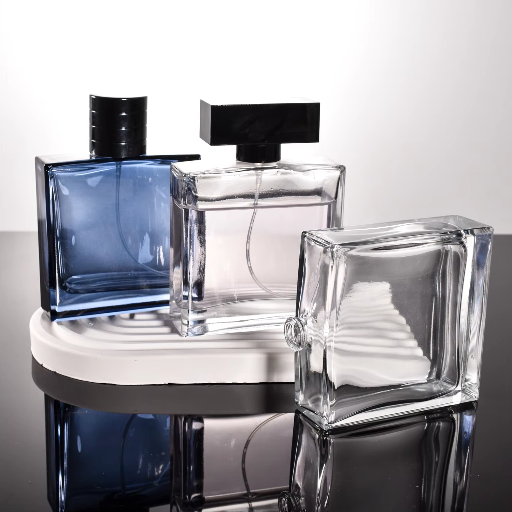
Square-shaped bottles possess an aesthetic appeal due to their neat lines, symmetry, and classic form. The dimensional build itself imparts a Westernized sense of structurality and sophistication, appealing to the consumer’s notion of modern elegance. The sharp outline of these bottles allows for a developing context of the brand to be cast upon, perhaps through embossing, bold typography, or a simple contrast in material. Additionally, square bottles offer greater storage efficiency, allowing for both practical display and easy transportation. It is the union of sound design and pleasing aesthetics that has caused such bottles to acquire special status in the fragrance industry, catering to both the artistic direction and the consumer’s comfort.
Balancing Elegance and Minimalism
In achieving that perfect balance of elegance and minimalism, square bottles focus on clean, geometric lines and under-emphasized detailing that somehow enhance their high level of sophistication, so subtle that it is hardly noticeable. Examples that represent the best in the industry use the finest materials, with minimal branding, and finishes that do not clamour: frosted glass, metals, etc. These elements further demonstrate workmanship and cater to contemporary tastes of simplicity and timelessness, making it the perfect complementary balance between aesthetics and usability.
The Visual Impact on Retail Shelves
Square fragrance bottles have the power to make a commanding visual impact on retail shelves by projecting qualities of order, symmetry, and a top-grade look. The sides of these bottles align perfectly from a geometric perspective when placed side by side, thereby utilizing shelf space to its maximum potential and achieving a pleasingly organized visual appearance. Most of the time, its small yet impactful minimalist design aids in cementing brand awareness by providing that clean canvas that draws attention to label decorations or embossing. From a practical perspective, then, the squared shapes fare better than other forms by resisting inconvenient tipping and facilitating easier packaging and storage. With their combined aesthetic appeal and functionality, it is no wonder that square-shaped perfume bottles remain an alluring proposition to brand owners and marketers seeking to capture consumer attention while enhancing brand recall.
Association with Timeless Luxury
Due to their architectural elegance and timeless appeal, square bottles have long been associated with timeless luxury. Firmly established perfume and packaging industry sources assert that their form suggests sophistication and permanence, the language subsequently used by distinguished high-end luxury houses. The geometric perfection lends these bottles not only an attractive silhouette but also imparts resonance with the minimalist language of contemporary design tradition. Moreover, the versatility of square bottles in accommodating elaborate customizations, such as frosted treatments, metallic highlights, or embossed logos, serves only to augment their stature in luxury contexts, thereby cementing their identity as emblems of top-tier craftsmanship and exclusivity.
Consumer Preferences and Market Trends
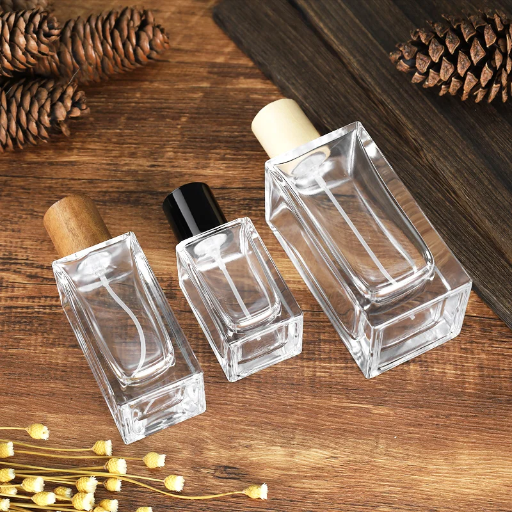
Consumer preferences and demands for luxury and high-quality merchandise are moving toward sustainability, customization, and physical differentiation. These changes are occurring in response to growing awareness of environmental impact and as brands attempt to incorporate eco-friendly materials and refillable packaging options. On the other hand, customization is highly demanded in the marketplace, with consumers eager to secure products that express their personal identity. Monogramming or just a few custom design touches are highly sought after. Minimalism remains alive, characterized by clean design and luxurious finishes, setting the current standards for contemporary luxury. In this sense, innovation and flexibility are crucial attributes for staying current and in demand in the highly competitive luxury market.
Why Buyers Choose Square Bottle Packaging
From my perspective, square bottle packaging strikes a fine balance between functionality, aesthetic value, and sustainability. The rectangular shape of square bottles maximizes storage space and facilitates easy stacking of the boxes for transportation, thereby minimizing space wastage and saving costs while improving logistics. From a visual perspective, the square bottles appear sleek and glamorous, a design that resonates well with minimalist trends; consumers who value contemporary design will be attracted to it. Being flat on the surface, square bottles also provide the best backdrop for the branding graphics and labeling, which aids in creating shelf impact. Lastly, square bottles tend to be durable and environmentally friendly, a facet that is becoming increasingly sought after by consumers nowadays.
Perception of Quality and Value
The perception that square bottles represent quality packaging and hold increased value is widespread. With its unique geometric forms, the packaging appeals to modern sensibilities and, at the same time, conveys to the consumer a sense of durability and craftsmanship. Highly regarded sources indicate that, in its simplicity, this structure embodies a purposeful and measured approach, which is commonly associated with designer products. It is further suggested that the highly efficient use of space, when comparing square bottles with aging and traditional containers, adds to both their practicality and efficiency, which contributes to their higher perception of quality. The eco-friendly materials of the square bottle, combined with the brand’s stylish branding and labeling, elevate the packaging’s look, making the product both aesthetically pleasing and functional. This would almost certainly leave the consumer with a delightful impression of the product.
The Role of Design in Consumer Choices
Design plays a crucial role in shaping consumer preferences and decision-making. It facilitates the purchase of a product or service, offering the most visually appealing choice, and rewards customers whose products feature an aesthetic and purposeful design. Factors such as color, typography, and packaging geometry elicit emotional responses that either create or diminish a product’s perception of quality, reliability, and brand identity. Additionally, brands and products that develop ergonomic and functional designs enhance the user experience, fostering trust and loyalty among consumers over time. More importantly, in today’s age of environmental consciousness, sustainable design, i.e., use of reusable materials and minimal packaging, are in tune with consumer values and give brands social points over others. In summary, when done well, design combines utility with emotion, profoundly influencing consumer choices.
Practical Benefits of Square Fragrance Bottles
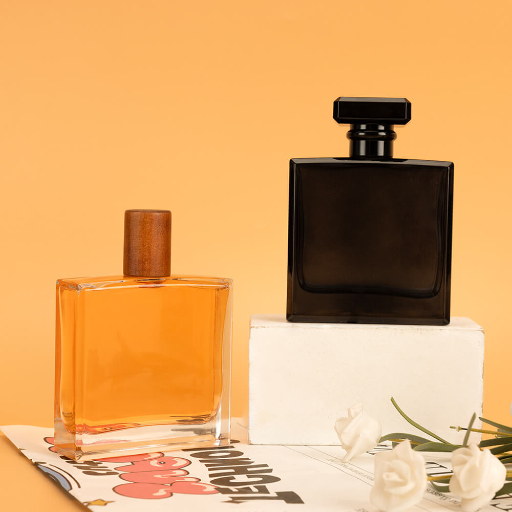
Square fragrance bottles present practical benefits that make them an attractive option for manufacturers. Depending on their geometry, they can be packed and stored efficiently. The square bottles will make the best use of the available space, as opposed to circular ones. In retail, warehousing, and shipping, this translates to a decrease in expenses and a loss of space in an already constricted area. Second, square pigeon bottles form a stable basis; during use or display, they are less prone to slipping. Such stability guarantees the safety and convenience of users, especially in awkward situations, such as when many items are placed on a bathroom counter. Another trade advantage of Square Bottles is the maximized labeling space, which allows manufacturers to communicate sufficient information about the product while also building their brand identity. Thus, these are functional benefits that contribute to optimizing the user’s experience and also make for logistical and marketing efficiencies.
Ease of Storage and Usability
Amongst the benefits lie the storage and use factors. From a therapeutic perspective, the geometrical form and topology ensure a full utilization of space during storage, as bottles can be easily placed side by side, making it suitable for massive retail shelves or personal home organization. The flat sides of square bottles ensure a firm grip while using them, making it less likely to slip compared to rounded ones. Additionally, since they have uniform dimensions, packaging and transportation are easier and pose a lower risk of damage during shipment. These utility factors offer a perfect design solution for customers and manufacturers seeking ease and durability in their approach.
Durability of Glass Bottles
The durability of glass bottles in square fragrance designs primarily depends on the thickness of the glass, the type of glass, and the integrity of the design. A high-quality glass used in square bottles is designed to resist impact and, in general, minimize breakage during regular handling or transportation. The angular design also adds support for potential stress points in comparison to more rounded containers. However, as in any glassware, they are still vulnerable to heavy impacts or severe pressure. Many producers apply different treatments, including tempered glass or protective coatings, to strengthen the resistance properties, so square fragrance bottles proudly walk the fine line between standards for durability and exquisite design.
Fine Mist Spray and Pump Functionality
Fine mist spray systems are engineered to bring about an even and consistent distribution of liquid particles into the atmosphere. The means typically include a pump, a dip tube, and an actuator, all working together to produce the most efficient atomization possible of the liquid contents. The operator depresses the pump, which then forces liquid up through the dip tube. At this point, the liquid is converted into a mist by passing through a fine mesh or nozzle. Advanced principles of fluid dynamics are employed to achieve the delicate atomization of the fragrance, ensuring a smooth spray action with distinct characteristics.
Today, this allows for defining various refinements that make their manipulation an enjoyable experience. Output flow resistance has been minimized, and more importantly, it is no longer possible to practice the varied output patterns. Most systems are designed with anti-clog and anti-leakage principles to ensure the device’s continuous function. To sum it all up, the use of hard-wearing materials, combined with aerodynamic nozzle designs and ergonomically friendly pump designs, ensures that these systems adhere to the extremely high standards required for use in fragrance, cleaning, and cosmetic products.
Tips for Selecting the Best Square Bottle Cologne
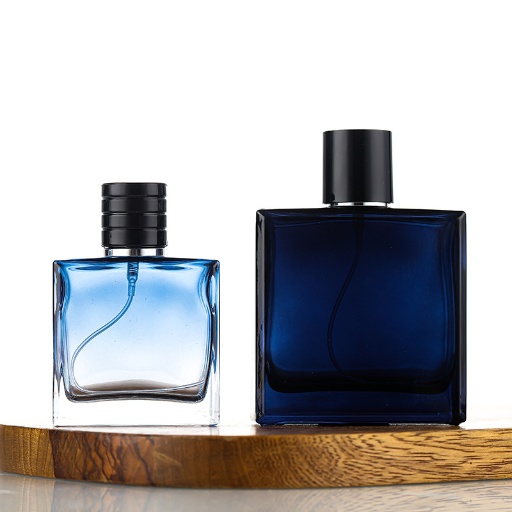
- Fragrance Composition: Evaluate the perfume’s scent profile, considering whether you prefer floral, woody, fresh, or oriental notes. Select colognes that suit both your taste and the occasions for which you plan to wear them.
- Longevity and Concentration: Based on the concentration–Eau de Cologne or Eau de Parfum–describe how much will remain after the scent has been allowed for some time. The stronger the concentration, the better the longevity.
- Design and Functionality: Evaluate the square bottle’s design in terms of aesthetics, durability, and practicality. Ensure the spray mechanism produces a consistent mist, one that is fine enough and without any leakage.
- Brand and Reviews: Research brands that are reputed for quality craftsmanship and customer-based reviews to verify performance and satisfaction. Typically, trusted brands offer reliable and well-tested products.
- Size and Portability: Depending on how portable you want the bottle to be and your budget, decide on the size. Smaller might be just right for travel; larger might be better for overall price value.
Thus, considering these parameters will help you arrive at a choice of square bottle cologne brands that properly meet your functional requirements as well as your taste.
Understanding Fragrance Notes
Fragrance notes are the components responsible for the cologne’s scent profile; in a typical classification, there are three layers of notes: top notes, middle or heart notes, and base notes. These scent layers work in tandem to convey the overall olfactory experience.
| Note Type | Duration | Characteristics | Common Examples |
|---|---|---|---|
| Top Notes | A few minutes to 1 hour | Light, fresh, highly volatile | Bergamot, Lemon, Citrus, Herbs |
| Middle/Heart Notes | Several hours | Core identity of fragrance | Lavender, Rose, Cardamom |
| Base Notes | Hours to a full day | Deep, lasting impression | Musk, Amber, Sandalwood |
Top notes are the very first scent that the nose recognizes immediately upon application of the perfume. They are usually light and fresh but tend to be highly volatile, lasting only a few minutes, rarely more than an hour. These can include citrus, herbs, or light fruits, such as bergamot or lemon.
Middle notes, also called heart notes or core notes, start to unfold as the top notes fade away. They maintain their presence for several hours, thereby giving a fragrance a distinct identity with which it is often associated. These could be floral, spicy, fresh, or green scents, such as lavender, rose, or cardamom.
Base notes are the deepest layer of the olfactory profile of the fragrance. They appear after application and slowly develop; therefore, these are the longest-lasting scent particles, frequently lasting from the basest pair of hours to a full day. They are great sounding notes, like musk, amber, or sandalwood, which leave a lasting impression.
Evaluating Brand Reputation
While funding square-bottle cologne, I research the well-known and highly rated brands first. Look for brands that maintain a high standard of quality in every aspect of production while innovating their fragrance compositions alongside incorporating premium ingredients. Trusted websites often consider consumer reviews, industry awards, and market longevity as criteria for brand credibility. I also examine various expert assessments and endorsements, which highlight the brand’s distinctive approach to balancing the fragrance layers, its commitment to sustainability, and the actual craftsmanship. These indicators consistently guide me toward the best choices for reliability.
Aligning Personal Style with Fragrance Choices
The following factors should be considered when aligning personal style with fragrance choices: fragrances that resonate consistently with one’s daily aesthetic, lifestyle, and preferences as outlined by authoritative sources. As popular guides have mentioned, understanding the key fragrance families —such as floral, woody, oriental, or fresh — is recommended, as this will help you choose a profile that matches your visual style and occasions. For example, lighter citrus scents pair well with casual daywear; deeper, more sophisticated notes, such as amber or oud, are better suited for evening or formal settings. Similarly, trusted websites recommend considering the impact of skin chemistry, as you can try a fragrance for some time to understand whether it complements your natural scent. Therefore, expert recommendations and curated collections, fostered by reputable brands, will make the selection process much more straightforward.
Reference Sources
-
How are perfume bottles manufactured? – This article explains the precise steps involved in manufacturing perfume bottles, including the design process.
-
How are perfume bottles designed? – A detailed look at the art and science behind designing perfume bottles, from inspiration to the final product.
-
How Packaging Influences Your Perception of Fragrance – Discusses how bottle design, including materials and shapes, impacts the perception of fragrances.
-
Perfume Bottles: An Evolution Through the Ages – A historical overview of perfume bottle designs from ancient times to the present.
-
Perfume Bottles: From the 17th Century to Modern Times – Explores the evolution of perfume bottles, highlighting key milestones and collaborations between designers and perfumers.

